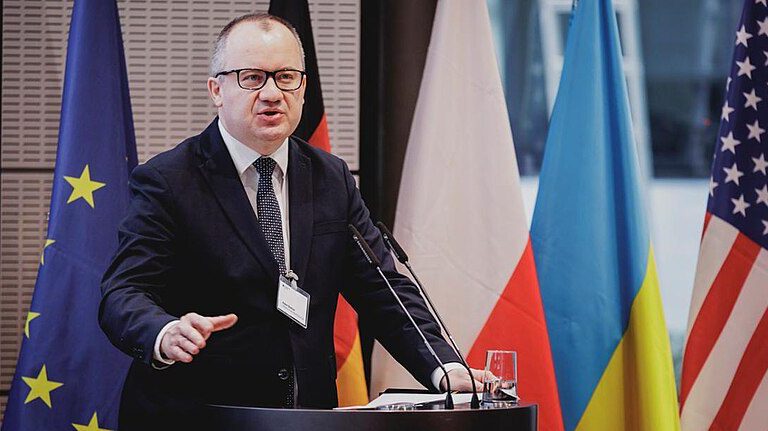
Polish justice minister Adam Bodnar
Photo: Gov.pl, CC BY 3.0 PL, via Wikimedia Commons
The left-liberal Polish government is “waiting” for conservative Andrzej Duda’s term as president to end so it can begin to “fully restore the rule of law in the country,” according to justice minister Adam Bodnar. Donald Tusk’s cabinet claims that Duda—who has promised to veto laws that threaten Polish interests—is standing in the way of cooperation with and funding from the European Union.
In a politically motivated move, the EU is ending so-called rule-of-law procedures against Poland and rewarding the country with billions of euros in EU funds simply because last year’s Polish elections brought in a new government—more Brussels-aligned, more federalist inclined.
On Tuesday, May 21st, Poland’s ‘rule-of-law’ issues came to the forefront of EU politics at an EU ministers’ meeting. It was held to discuss, among other things, the left-liberal Polish government’s steps to ‘fix’ the judicial reforms of the previous government, led by the conservative Law and Justice (PiS) party.
PiS, which governed Poland between 2015 and 2023, was accused by the Brussels political elite and European liberals of violating the rule of law. In 2017, a so-called Article 7 procedure was launched against the country by the European Commission, according to which a member state’s rights, including voting rights, can be suspended if it is established that it is persistently breaching the EU’s ‘values.’ In addition, billions of euros worth of EU funds owed to Poland were frozen under the same rule-of-law pretext.
However, after Donald Tusk’s leftist-liberal coalition came to power in December, the Commission started to unblock these funds in April, and earlier this month, the Commission declared that it would end the Article 7 procedure. As we reported, these moves were made despite the government only promising to make the necessary legislative steps, not actually implementing them.
According to Polish conservative media outlet Wpolityce, the decision to reward Tusk’s government was made after a meeting between Tusk and Commission President Ursula von der Leyen in the middle of December, where the new Polish PM promised he would support von der Leyen’s reelection bid in exchange for EU funds. Shortly thereafter, on the same day, the Commission announced it would transfer the first batch of money to Warsaw.
Hungary’s sovereigntist, conservative government has a similar Article 7 procedure looming over it, and its EU Affairs Minister János Bóka was the only EU minister who objected on Tuesday to the “blatant double standards” practised by Brussels. He said the Commission’s assessment of Poland “reinforces the view that Article 7 is nothing but a tool for political blackmailing.”
European Commission Vice-President Věra Jourová acknowledged that “not all legislative acts have been fully adopted” by Poland, “we are aware that some things will go faster and some slower,” but she said Brussels no longer sees serious violations of the rule of law in Poland.
Today’s discussion was an important step on the path to close the Art. 7 concerning #Poland soon.
— Věra Jourová (@VeraJourova) May 21, 2024
I presented the assessment of the @EU_Commission to the ministers on the #GAC meeting finding that there is no longer a clear risk to the breach of the rule of law. pic.twitter.com/OScBoSMjLI
Speaking to EUobserver on Tuesday, Polish justice minister Bodnar said the government may have to wait for Andrzej Duda’s presidential term to end in 2025 before it can push through all the bills necessary to “restore the rule of law.” Duda, who is an ally of the conservative opposition PiS, has spoken out against some of the proposals, and may block some of them. The president has also accused the European Commission of “double standards” for failing to condemn rule-of-law violations under the new government—the aggressive takeover of the Polish public broadcaster and the arrest of two ex-PiS ministers. Brussels also made no comment either on the police raid of former Justice Minister Zbigniew Ziobro’s home in March.
